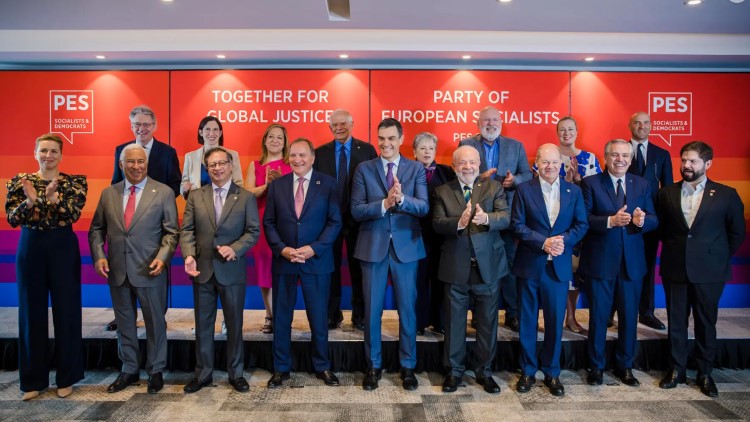Eduardo González
The Heads of State and Government of the European Union (EU) and the Community of Latin American and Caribbean States (CELAC) spoke out yesterday against Russia’s war in Ukraine, including the representatives of Cuba and Venezuela and with the sole exception of Nicaragua.
At the end of the Summit, the leaders of the two regions adopted a final declaration in which they commit “to renew and further strengthen” the bi-regional partnership, “which is based on shared values and interests and strong economic, social and cultural ties,” and to strengthen dialogue and continue “working together as sovereign partners” to “address the multiple crises and challenges of our time, such as food insecurity, poverty, inequalities in both regions, supply chain disruptions and rising inflation.”
They also commit to “mitigate the adverse effects of climate change and environmental degradation” in light of “different national circumstances” and to promote and protect “all human rights and fundamental freedoms.” The signatories also pledge to uphold the rule of law and democracy, “including free and fair, inclusive, transparent and credible elections,” as well as freedom of the press, multilateralism, international cooperation, the objectives of the UN Charter and international law, including “the principles of sovereignty, self-determination, non-intervention in matters that are essentially within the domestic jurisdiction of States” and the renunciation, in their international relations, of “the threat or use of force against territorial integrity.”
In this regard, the leaders signing the declaration express their “deep concern on the ongoing war against Ukraine, which continues to cause immense human suffering and is exacerbating existing fragilities in the global economy, constraining growth, increasing inflation, disrupting supply chains, heightening energy and food insecurity and elevating financial stability risks.”
The statement therefore supports “the need for a just and sustainable peace,”, reiterates its “support for the Black Sea Grain Initiative and the efforts of the UNSG to secure its extension (Russia has just announced, precisely, its decision not to renew the agreement)” and supports “all diplomatic efforts aimed at a just and sustainable peace in line with the UN charter.”
“We recall our specific national positions as expressed in other fora, particularly at the United Nations Security Council and the United Nations General Assembly,” the text goes on to say, “We reaffirm our commitment to the Charter of the United Nations and International Law, including the need to respect the sovereignty, political independence and territorial integrity of all nations,” it adds.
As stated by the President of the European Council, Charles Michel, at the press conference following the summit, “this declaration has been endorsed by all countries, with the exception of one which was unable to subscribe to it because of a paragraph.”
Throughout the Summit, the EU intensified negotiations with all CELAC countries to reach a consensus on the rejection of the war, but they encountered the stumbling block of Nicaragua, Cuba and Venezuela. “We have discussed a lot, of course, about the fact that everyone wants this war to end and for there to be a lasting peace centered on the UN Charter,” said the president of the European Commission, Ursula Von der Leyen, at the same press conference, which was also attended by the president of Argentina, Alberto Fernández (who defended “a lasting solution to the situation in Ukraine” and called for “peace and de-escalation of the conflict”), and the Prime Minister of Saint Vincent and the Grenadines and President pro tempore of CELAC, Ralph Gonsalves. The President of the Government, Pedro Sánchez, a great supporter of the Summit in the context of the Spanish Presidency of the EU, did not take part in the press conference, despite his name appearing on the agenda, because he preferred to participate in an electoral event in San Sebastián.
Finally, Cuba and Venezuela accepted the text of the declaration, but Nicaragua stuck to its guns and refused to criticize Russia’s war in Ukraine, as it did in the various votes held in the UN General Assembly on the same issue.
Trade agreements and summits every two years
The European and Latin American leaders also commit in the declaration to continue “strengthening and developing trade and investment relations between the EU and CELAC countries and regions” and stress “the importance of the full implementation of the Association and Trade Agreements between the EU and CELAC partners”. Therefore, they “call for the ratification of the signed and currently implemented agreements” and welcome “the ongoing processes for the signature of the modernized agreement between the EU and Chile and the EU and Mexico in the coming months”. “We take note of the ongoing work between the EU and Mercosur”, the text adds.
Finally, the two parties show their “common strategic interest in regular high-level engagement between the EU and CELAC” and agree to “hold Summits every two years, the next in the CELAC region in 2025, and meetings of foreign ministers to take forward shared commitments.” In this regard, they expect to “continue to review the implementation of the bi-regional roadmap 2023-2025, presented at this Summit”, and announce the creation of “a consultative body for coordination between the EU and CELAC to ensure continuity and follow-up between high-level meetings and to prepare and organize the EU and CELAC Foreign Ministers’ meetings”.







